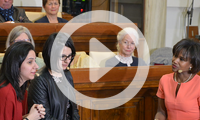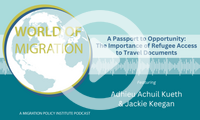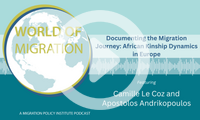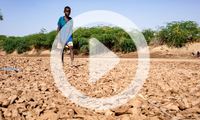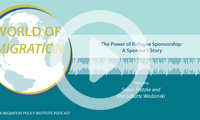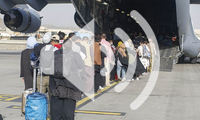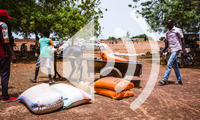Multimedia
Marking the one-year withdrawal of U.S. troops from Afghanistan and the fall of Kabul to the Taliban, this webinar reflects on the humanitarian and development challenges in Afghanistan and for neighbors, the difficult choices facing aid donors, and what needs to be done to ensure at-risk Afghans can reach safety.
Digital innovations—including automatic verification of health and vaccination results—are reopening economies and global mobility while setting the standard for new ways of managing mobility and health that will outlast the pandemic. Dr. Pramod Varma, chief architect of India's COVID pass system, DIVOC; Dr. Edem Adzogenu, founder of the Afro Champions Initiative; and MPI's Lawrence Huang discuss these innovations on this episode of Moving Beyond Pandemic.
On this webinar, speakers examine how government strategies, practices, and instruments of integration policymaking have adapted during the pandemic both in Europe and North America, and what lessons there are for the future.
This MPI Europe webinar examines how referral mechanisms can be designed so that returnees receive the core services they need, while also ensuring support is embedded within the local community.
Este seminario web, que presenta el lanzamiento de un informe, examina el potencial de Canadá, México y Costa Rica para expandir los programas de trabajadores temporales para los centroamericanos, ofreciendo un medio importante para convertir algunos flujos irregulares en flujos legales.
This webcast presents research findings on temporary employment pathways for Central American migrants in Canada, Mexico, and Costa Rica.
Con motivo de la publicación de un informe del Instituto de Política Migratoria sobre posibles vías de protección para las personas centroamericanas, este webcast ofrece un análisis sobre las vías humanitarias y de reasentamiento que ya se utilizan en la región así como las oportunidades y los obstáculos para expandir estos programas.
Marking the release of a Migration Policy Institute report on possible protection pathways for Central Americans, this webcast offers analysis on regional resettlement and humanitarian channels and the opportunities and obstacles to expanding these programs, along with specific actions that the United States and Canada could take.



